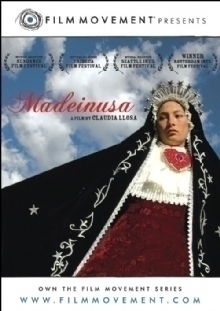Plot
Set in the fictional small and isolated indigenous village of Manayaycuna ("the town no one can enter" in Quechua) in the Peruvian Andes, the story covers three days in the lives of the villagers and a stranger from Lima. The stranger, Salvador (Carlos de la Torre), is sent by a mining company to evaluate the geology of the area, but must stay in Manyaycuna over the weekend until travel can be provided. Salvador appears to be unwelcome he has arrived at the beginning of Tiempo Santo ("Holy Time"), a syncretic religious festival spanning Good Friday and Easter Sunday, and is sequestered in a barn by the town's mayor, Cayo. The villagers of Manayaycuna believe that during Holy Time, God, symbolized by an effigy of Christ, is dead and, therefore, nothing is a sin. Cayo is the father of the strangely named Madeinusa (Magaly Solier), a teenage girl who is the eponymous protagonist of the film, and has long been trying to take her virginity. However, Madeinusa has been able to hold him off, promising she will relent during Holy Time.
At the beginning of the weekend, Madeinusa is selected as the festival's Mater Dolorosa, much to her sister Chale's dismay. Madeinusa, desperate to leave the village and go to Lima, where her mother left for many years before, becomes interested in Salvador and has a conversation with him in the family's barn. During the town's night march, Madeinusa loses her virginity to Salvador. When Cayo finds out, he acts intimidatingly to Salvador, but does not physically harm him. Later, the film shows Salvador watching through a crack in the house's wall as Cayo has sex with Madeinusa. Madeinusa begs Salvador to take her with him back to Lima against the backdrop of the high sierra Andean landscape. At the end of the film, Madeinusa slips rat poison into her father's soup, poisoning him. The two sisters place the blame on Salvador and the film ends with Madeinusa sitting in what would be Salvador's spot on the truck back to Lima, suggesting he was killed or imprisoned by the villagers.
This page is based on this
Wikipedia article Text is available under the
CC BY-SA 4.0 license; additional terms may apply.
Images, videos and audio are available under their respective licenses.
